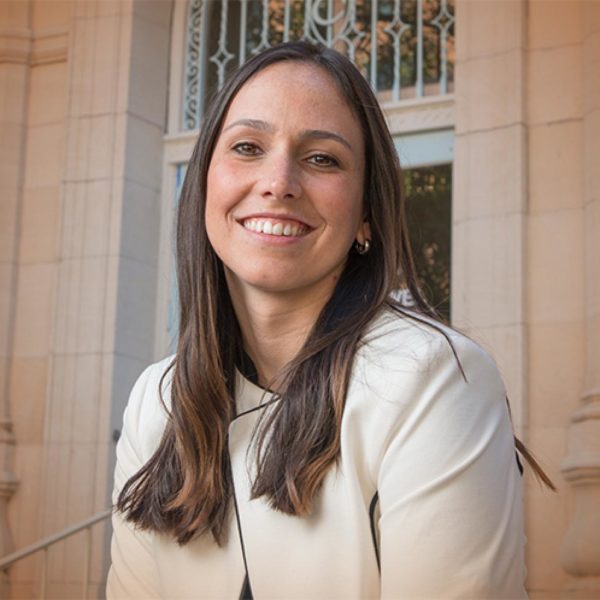AUSTIN, Texas — Livia Schiavinato Eberlin, an assistant professor of chemistry at The University of Texas at Austin, has won a MacArthur Foundation Fellowship, sometimes called a “genius” award. The prestigious, no-strings-attached five-year fellowship awards $625,000 to each recipient.
“I feel extremely honored and humbled because this is a very special fellowship that recognizes people for their talent and creativity, not for a specific project or their past work,” Eberlin said. “They trust your work has and will continue to impact society and I am so thankful for that.”
Each year, the MacArthur Foundation selects talented individuals who have shown exceptional originality in and dedication to their creative pursuits.
“Dr. Eberlin’s research places her at the vanguard of a worldwide effort to fight cancer,” said Gregory Fenves, President of UT Austin. “Her brilliant research has resulted in new technology that can lead to more accurate diagnoses and more effective treatment for patients. As a young scientist, Dr. Eberlin has already accomplished much, and we look forward to more discoveries in her future. It’s truly an honor to have her as a member of the UT faculty.”
Listen to an interview with Eberlin on the “Point of Discovery” Podcast
Eberlin is developing new ways to identify cancerous tissue to improve outcomes for patients using a chemical analysis method called mass spectrometry. One tool she has developed, called the MasSpec Pen, enables a surgeon to rapidly differentiate cancerous tissue from healthy tissue directly in patients in a surgical setting, which might help them decide what to remove and what to leave intact. It can also be used on tissue samples taken from a patient to help clinicians diagnose disease and choose the most effective treatment option for an individual. Significant funding for the project comes from the Cancer Prevention Research Institute of Texas.
“From early in her career, Dr. Eberlin has inspired a great many people through her ability to apply cutting-edge scientific thinking to real-world challenges, including explorations of safer, more effective treatment for cancer,” said Paul Goldbart, dean of the College of Natural Sciences. “We are tremendously proud of her and of the ways in which she demonstrates our campus motto: ‘What starts here changes the world.’ ”
To enable such diagnoses, she is also discovering biomarkers associated with different types of cancers. Her team has applied mass spectrometry imaging to identify biomarkers, including those produced by hard-to-treat cancers such as oncocyctic thyroid tumors and ovarian high-grade serous carcinoma. Using machine learning, they have discovered unique fingerprints for these types of cancers. By comparing the chemical patterns produced by tissues in new patients to these fingerprints, her tools may provide clinicians the information they need to make better treatment choices.
Eberlin received a B.S. (2007) from the Universidade Estadual de Campinas in Brazil and a Ph.D. (2012) from Purdue University. She was a postdoctoral fellow at Stanford University from 2012 to 2015, and in 2016 she joined the faculty of The University of Texas at Austin.
Among her numerous awards, Eberlin was cited on the “30 under 30” list by Forbes magazine, she was named a “Science Super Hero” by the Discovery Channel, and she received the L’Oréal USA For Women in Science Fellowship. The MasSpec Pen won an Interactive Innovation Award at this year’s South by Southwest Conference. A fictional cancer-detecting pen based on the MasSpec Pen was featured earlier this year on the ABC show “Grey’s Anatomy,” with Eberlin consulting writers on how the device works.
Eberlin is the first UT Austin faculty member to receive a MacArthur fellowship this century. Seven other UT Austin faculty members were previously awarded MacArthur Foundation fellowships: Jacqueline Jones, (History, 1999) David Hillis (Integrative Biology, 1999), Nancy Moran (Integrative Biology, 1997), Nora C. England (Linguistics, 1993), Philip Uri Treisman (Mathematics, 1992), Thomas G. Palaima (Classics, 1985) and Karen K. Uhlenbeck (Mathematics, 1983).
The MacArthur Fellows Program is intended to encourage people of outstanding talent to pursue their creative, intellectual and professional inclinations. In keeping with this purpose, the foundation awards fellowships directly to individuals rather than through institutions. Recipients may be writers, scientists, artists, social scientists, humanists, teachers, entrepreneurs, or those in other fields, with or without institutional affiliations. They may use their fellowships to advance their expertise, engage in bold new work, or, if they wish, to change fields or alter the direction of their careers.
Note to reporters: Photos and a video of Eberlin, examples of the MasSpec pen in action and other multimedia assets are available at: https://utexas.app.box.com/s/lwt6p1fyucjrb0oc2il83y5islhjk9av
